In today’s digital age, businesses in all industries are increasingly turning to online advertising to reach their target audience and expand their customer base. For accountants, understanding digital marketing strategies are no longer optional but essential for success. In a competitive field as accounting, finding the most efficient ways for attracting and converting prospects into customers online is crucial.
Google Ads offers one of the fastest ways to achieve success. By leveraging Google Ads, accountants can effectively enhance their online presence, increase brand visibility, drive targeted traffic to their websites, and ultimately convert potential clients into actual customers. The platform’s ability to connect accountants with other businesses actively searching for accounting services makes it an essential tool for successful online advertising within the accounting industry.
In this guide, we explore the unique benefits of using Google Ads in the accounting industry and provide practical tips for running successful campaigns.
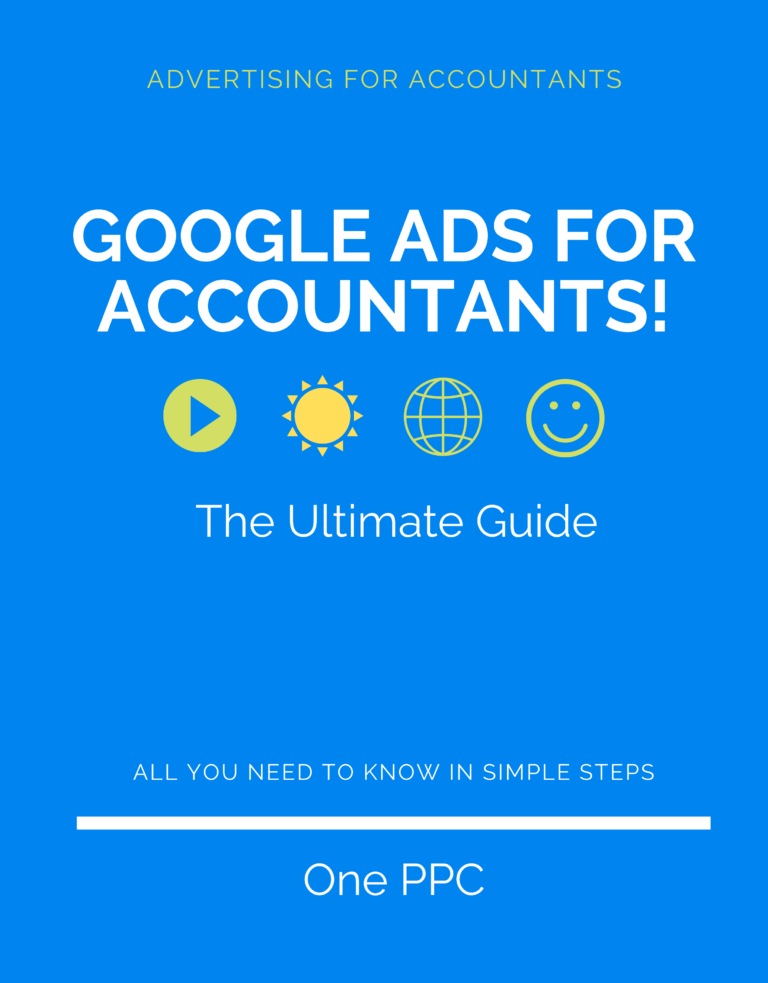
Table of Contents
- How Google Ads Works
- Targeting is the Key To Success
- Keyword Selection & Negative Keywords
- Understand Keyword Match Type
- Choose Your Battles
- Negative Keywords
- Audience Targeting for Search
- Location Targeting Methods
- Track Leads with Conversion Tracking
- Ad Copy Tips
- Website Call Tracking
- Landing Pages for Each Service
- Conclusion
How Google Ads Works
Google Ads, formerly known as AdWords, stands as the largest online advertising platform globally. Created by Google, this platform furnishes advertisers with an array of potent tools to effectively target audiences and promote their services, making it ideal for professions like accounting.
Google Ads operates on a pay-per-click (PPC) model, enabling advertisers, including accountants, to bid on relevant keywords tied to their services, such as “accounting services.” When users search for these specific keywords on Google, your ads are displayed alongside the organic search results. Uniquely, you are only charged when users click on your ads, ensuring that your budget is employed efficiently.
The platform offers a diverse selection of ad formats, including text-based ads, image ads, video ads, and interactive ads. Depending on their marketing objectives, advertisers can select the format that aligns best with their goals, captivating potential clients with visually engaging and informative content.
One of Google Ads’ pivotal advantages lies in its precise targeting capabilities. Accountants, for example, can delineate their target audience based on variables such as location, demographics, interests, and specific keywords. This precision targeting enables them to reach individuals or businesses actively searching for accounting services, thereby enhancing the likelihood of securing qualified leads.
Furthermore, Google Ads presents an array of tools and features designed to assist advertisers in managing and optimising their campaigns. These features include the ability to control the budget, schedule ads to appear at designated times, track ad performance, monitor conversions, conduct comprehensive keyword research, and target specialised audience segments.
Complementing these features, Google Ads also supplies comprehensive data and analytics. This empowers users to make informed, data-driven decisions, honing their campaigns to achieve superior results. The integration of such insights forms a strategic pathway to continuously improve advertising efforts, rendering Google Ads a powerful tool in the modern advertising landscape.
Targeting is the Key To Success
Targeting is the most crucial factor for the success of your Google Ads Search campaigns, especially for accountants. To achieve optimal results, your main goal should be to connect with highly qualified prospects who are already at the bottom of the marketing funnel. Fortunately, Google offers a range of targeting options that allow you to refine and enhance your advertising efforts.
Keyword Targeting:
Keyword selection is key to ensuring that you are spending your budget on the searches most likely to result in new customers.
Accountants face competition not only from other service providers, whether locally, nationally, or even internationally, but also from industry software providers like Sage, Xero, and QuickBooks. Therefore, you must choose your battles carefully to win the war, and this is where strategic keyword selection plays a vital role.
Audience Targeting:
In addition to keyword targeting on Google Search, the ad platform also provides audience targeting options. These options include targeting past website users, reaching similar audiences, and connecting with in-market audiences.
These audiences can be overlaid upon keywords on Google Search Network, or used separately on the Google Display Network. Audiences can also be excluded to refine targeting (for example, blocking large companies with over 10,000 employees, etc.).
You can refine your targeting based on factors such as age, gender, income, parental status, marital status, education, company size, and more. This level of precision ensures that your ads are displayed to the most relevant and qualified prospects, thereby increasing the likelihood of boosting brand awareness and generating quality leads.
Keyword Selection & Negative Keywords
When it comes to keyword selection for your Google Ads campaign, it’s important to make strategic choices to align your services and target audience. Here are some tips to enhance your keyword selection process:
1. Identify Your Services:
Determine which specific services you want to advertise, such as tax, or specific accounting services like bookkeeping, payroll, monthly accounts, year-end, etc. This will help you focus your keyword selection on relevant terms related to each service.
2. Emphasize Commercial Intent:
Opt for keywords that demonstrate explicit commercial intent rather than informational intent. For instance, keywords like “accountancy services” and “accountant firm” are stronger choices compared to generic terms like “accountancy.” Similarly, “tax filing services” is a more effective keyword than simply “tax filing,” while “tax preparation services” is preferable to just “tax preparation.” Focusing on commercial intent keywords will attract users who are actively seeking accounting services.
3. Employ Negative Keywords:
Use words like job, training, career etc to block irrelevant searches. Then reviewing search terms to identify any irrelevant searches. You can also add exact match single negative keywords, such as “accountancy,” to ensure your ads are not triggered by searches that don’t align with your target audience. Your ad would still show for accountancy services or accountancy firm as these are not an exact match of the negative keyword [accountancy]
4. Choose Professional Terms:
For single-word keywords, opt for terms that convey the professional aspect of your services. For example, “accountant” is more relevant than “accountancy,” and “bookkeeper” is more relevant to “bookkeeping.” This approach helps refine your keyword selection and attract users searching for professional accounting services.
5. Utilise the Google Keyword Planner:
Take advantage of the Google Keyword Planner, formerly known as the Google Keyword Tool, to generate a wide range of keywords specific to each accountant service. This tool provides insights into keyword search volume, competition, and related terms, aiding you in identifying effective keywords for your campaigns.
By following these guidelines and utilising the Google Keyword Planner, you can refine your keyword selection and target the most relevant terms for your accountant services. This strategic approach will enhance the performance of your Google Ads campaigns and attract qualified prospects in the UK.
Understand Keyword Match Type
Keyword match types play a crucial role in determining how closely a search term must match a keyword in your Google Ads account. It’s important to understand the different match types and their implications to ensure your ads are displayed to the most relevant audience. Let’s explore the significance of match types and how to use them effectively for accountants advertising on Google Ads.
Default Broad Match Type:
The default match type in Google Ads is broad match, which shows your ads for a wide range of searches that may include variations, synonyms and related terms. While broad match can reach a larger audience, it may also display your ads for less relevant searches. For example, if your keyword is “accountancy services,” your ad might show up for searches related to “bookkeeping,” which may not be ideal for your advertising goals.
We recommend at the very least starting with phrase and exact match. Later on broad match can be tested, but ideally you want to integrate a CRM system to ensure you are optimising for a sales cycle event after the initial lead/form submission (e.g. Sales qualified lead, quote etc). This is a better way of working up the funnel by optimising for quality leads, instead of quantity.
Utilising Phrase and Exact Match Types:
To ensure more precise targeting, it’s recommended to use phrase match and exact match types for your keywords. Phrase match requires the search term to include the complete keyword phrase in the specified order, while allowing additional words before or after the phrase. Exact match, on the other hand, requires the search term to exactly match the keyword without any additional words.
Changes in Exact Match:
It’s important to note that Google has made changes to the exact match type, and it is no longer entirely “exact.” Google now includes close variants such as plurals, misspellings, and variations in word order. For example, if you have the keyword [accountant], it may now show for searches related to “accountancy.” To mitigate this, consider adding “accountancy” as a single-word exact match negative keyword to prevent your ad from showing for irrelevant searches.
Leveraging Match Types:
Exact match, although not entirely “exact” anymore, is often referred to as “intent match” as it aims to capture the precise user intent behind the search. It can be particularly useful for targeting specific keywords related to the accountant industry. By using exact match and phrase match, you can refine your targeting and ensure your ads are displayed to users actively seeking the accounting services you offer.
In summary, understanding and leveraging keyword match types is essential for effective targeting and controlling the relevance of your Google Ads campaigns. While broad match provides a wider reach, it may display ads for less relevant searches. By utilising phrase match and exact match, you can narrow down your audience and improve the accuracy of your ad targeting. Be aware of the changes in exact match and use negative keywords, such as “accountancy” in the accountant industry, to prevent unwanted ad impressions. With a thoughtful approach to match types, accountants can enhance the performance of their Google Ads campaigns and attract highly relevant prospects.
To learn more see our article Match Type for Google Ad Tips
Choose Your Battles
Additionally, if you are a local service provider in a specific city like Southampton, you may want to avoid targeting people searching for broader nationwide terms like “UK accountants” instead of more location-specific searches such as ” Southampton accountants”.
Negative Keywords
Utilising negative keywords is crucial for blocking job searchers and other search engine users who are not prospective customers. By excluding irrelevant terms from your Google Ads campaigns, you can focus your budget and efforts on attracting qualified leads. Here are some tips to effectively use negative keywords:
1. Identify Irrelevant Terms:
Start by identifying keywords that are not relevant to your accounting services. These may include terms like “jobs,” “training,” “career,” “apprenticeship,” as well as software-related terms like “software” and “SAAS.” These keywords indicate that the user’s intent is not aligned with your services and can be blocked as negative keywords.
2. Run Search Terms Report:
Regularly review the search terms report in your Google Ads account. This report provides insights into the actual search terms that triggered your ads. Look for any terms that are unrelated to your services or attracting irrelevant clicks. Add these terms as negative keywords to prevent your ads from showing to users with no purchase intent.
3. Consider Location-Specific Negative Keywords:
If you operate within a specific location, consider adding location-specific negative keywords. For example, if you provide accounting services in London, you may want to exclude terms like “accountants in Manchester” or “accountants in Birmingham” to avoid attracting users looking for services outside your targeted area..
5. Ongoing Refinement:
Continuously monitor and refine your negative keyword list based on new search terms or trends that emerge. Regularly review your search terms report and keep an eye on industry-specific keywords that may be attracting unwanted traffic. By staying proactive and adjusting your negative keyword strategy, you can continually improve the quality of your ad impressions.
Remember, the goal is to target users who are actively searching for accounting services and are likely to convert into customers. By carefully managing negative keywords, you can optimise your campaigns to focus on high-quality traffic and improve the overall effectiveness of your Google Ads efforts.
By implementing these strategies, accountants can ensure that their Google Ads campaigns are tailored to attract relevant prospects while minimising wasted ad spend on irrelevant clicks. Take advantage of the search terms report and regularly update your negative keyword list to refine your targeting and optimise campaign performance.
To learn more about negative keywords you can read our blog post ultimate guide to negative keywords.
Audience Targeting for Search
To kickstart your Google Ads journey in the accountant industry, it’s essential to connect with highly qualified prospects who are already at the bottom of the marketing funnel. Reaching the most relevant and qualified target market should be your top priority when utilising Google Ads. Luckily, Google offers a wide range of targeting options that work in conjunction with base targeting options.
Remarketing to Past Website Users:
Building upon your keyword or DSA strategy, remarketing allows you to stay top of mind with users who have previously visited your website. By placing a tracking pixel on your site, you can display tailored ads to these past visitors as they search in Google, reinforcing your brand and increasing the chances of conversion. Search Remarketing is an effective way to re-engage potential clients in the accountant industry who have already shown interest in your accounting services.
Similar Audiences:
By combining similar audiences with your keyword or DSA campaigns, you can expand your reach and connect with individuals in the accountant industry who share characteristics with your existing customer base. Google analyses the browsing habits, interests, and demographics of your current customers to identify and target similar users. This layered targeting approach allows you to tap into new and relevant segments that have a higher likelihood of converting into customers for your accounting services.
In-Market Audiences:
In conjunction with keywords or DSA, you can target users who are actively researching or displaying purchase intent in specific categories related to accounting services. By focusing your ads on in-market audiences in the accountant industry, you can connect with individuals who are actively seeking accounting solutions or exploring service providers. This layered targeting option maximises your exposure to potential clients who are already in the decision-making process in the accountant industry.
Demographic Targeting:
Layering demographic targeting on top of your base targeting options further refines your campaigns. By utilising demographic targeting options such as age, gender, income, parental status, marital status, and education, you can narrow down your target audience within the accountant industry. This layered approach allows you to tailor your ads to specific demographic segments, increasing the relevance and effectiveness of your campaigns.
By effectively utilising these layered targeting options offered by Google Ads, accountants in the UK can ensure that their ads are displayed to the most qualified and relevant audience in the accountant industry. This strategic approach maximises the chances of converting prospects into customers for accounting services and optimises your advertising budget by focusing on those most likely to engage with your services in the accountant industry.
Location Targeting Methods
Many accountants who use Google Ads are local business service providers. For this reason, proximity plays a significant role in the likelihood of converting prospects into customers. Whilst it’s true that accountants may have clients nationwide, when it comes to advertising, starting with a focus on local areas is generally more effective. As you expand your budget, you can gradually broaden your targeting radius. By narrowing down the competition, you can specifically target prospects who are searching for accountants in their own city or town.
Google offers various location targeting options that allow you to refine your campaigns based on specific locations, such as towns, cities, radius distance, or even postcodes. By leveraging these features, you can adjust your bids and strategies to suit each location accordingly.
Here are some tips for optimising your local targeting in Google Ads:
1. Use Location Targeting:
Set up location targeting within your Google Ads campaign settings. Aim to target areas closest to your office or service location. This helps increase the chances of attracting prospects within your immediate vicinity, where conversion rates tend to be higher.
2. Implement Location-Specific Keywords:
Incorporate location modifiers in your keywords to signal your local presence. For example, use keywords like “accountant Southampton,” “tax adviser Southampton,” or “bookkeeper Southampton.” This helps ensure that your ads are shown to users searching for accounting services in your specific area.
3. Utilise “Near Me” Keywords:
Include “near me” modifiers in your keywords to capture users who are actively seeking accounting services in their vicinity. Keywords such as “accountant near me” or “tax adviser near me” can help you connect with prospects who are geographically close to your office, increasing the likelihood of conversion.
4. Adjust Bids Based on Distance:
Consider adjusting your bidding strategy based on the distance between the user’s location and your office. Increase bids for users in closer proximity to maximise the chances of attracting local prospects. This approach aligns with the principle that proximity often results in higher conversion rates, even if clients may not physically meet you.
It’s important to keep in mind the concept of diminishing returns and the 80/20 principle, which are applicable to Google Ads as well. By focusing on local targeting and refining your campaigns based on location, you can optimise your ad spend and increase the effectiveness of your Google Ads efforts.
By implementing these strategies and leveraging Google Ads’ location targeting features, accountants can maximise their visibility within their local markets, attract nearby prospects, and achieve higher conversion rates.
Track Leads with Conversion Tracking
Recording leads in Google Ads allows you to see which keywords and ad copy are performing best, as well as which locations and campaign types are most effective. This valuable data enables you to allocate your budget more efficiently and achieve a better return on investment (ROI).
In the accounting industry, the ratio of phone call leads to contact form submissions is typically higher. Tracking phone calls as conversions can be done in two primary ways:
Google’s Website Call Conversion Tracking:
This method involves using Google’s call tracking feature, which assigns a unique phone number to each site visitor. As accountants get many of their leads over the phone, this is highly useful conversion data-points to report and optimise your Google Ads.
However, note that displaying a unique number may confuse customers, so consider this before implementing the tracking.
Event Tracking in Google Analytics using Tag Manager:
An alternative approach is to use event tracking in Google Analytics, combined with Google Tag Manager, to record click-to-call buttons as conversions. By setting up click events as goals in Google Analytics and importing them as conversions into Google Ads, you can have more flexibility without modifying the displayed phone number. Keep in mind that this method may not capture all phone calls, such as those made by manually dialing the number or using alternative devices like office phones.
Additionally, it’s crucial to track enquiries received through your contact form as conversions within Google Ads. By setting up conversion tracking for contact form submissions, you can ensure that you capture as many conversions as possible directly within the Google Ads platform.
By effectively tracking leads and conversions in Google Ads, you gain valuable insights into the performance of your campaigns. You can identify the most successful keywords, ad messaging, locations, and campaign types, enabling you to allocate your resources to the areas that yield the best results. This data-driven approach helps improve the overall efficiency and effectiveness of your Google Ads campaigns in the accounting industry.
Remember to regularly monitor and analyse your conversion data, making adjustments as needed to optimise your campaigns and drive better outcomes. By continually refining your strategies based on conversion tracking, you can achieve higher conversion rates, improve your ROI, and ultimately grow your accounting business.
Ad Copy Tips
When creating ad copy for your Google Ads campaigns as an accountant, there are several strategies you can employ to optimise your messaging and attract more qualified leads. Here are some key tips to consider:
Incorporate Town or City Name:
Including your town or city name within the ad copy can make your ads more relevant and appealing to local prospects. It helps create a sense of proximity and establishes a connection with potential clients in your specific location. For example, you can use phrases like “Trusted Accountant in [Town/City Name]” or “Expert Accounting Services in [Town/City Name].”
Utilise Google My Business:
Take advantage of Google My Business, a free tool that allows you to manage your online presence on Google. By setting up your Google My Business profile and linking it to your Google Ads account, you can showcase your office address and phone number below your ads. This is known as location ad extensions and helps potential clients easily find and contact your business.
Implement A/B Ad Testing:
Conduct A/B ad testing by creating different versions of your ads to determine which resonates best with your prospects and customers. Test various elements, such as headlines, descriptions, call-to-actions, and offers, to identify the most effective combinations. This testing approach helps validate assumptions and refine your ad copy based on data-driven insights.
Focus on Your Business Offering and Unique Value Proposition:
Clearly communicate your unique value proposition in your ad copy. Highlight what sets your accounting services apart from the competition, such as personalised attention, years of experience, industry specialisation, or free consultations. Emphasise the benefits clients can expect from choosing your services to differentiate yourself and attract more qualified leads.
Use Compelling Call-to-Actions:
Incorporate strong and compelling call-to-actions in your ad copy to encourage prospects to take action. Use phrases like “Contact Us Today,” “Get a Free Consultation,” or “Book an Appointment Now” to prompt users to engage with your services. Clear and persuasive calls-to-action can significantly increase click-through rates and conversions.
Remember, consistency and relevance are key when crafting your ad copy. Ensure that your messaging aligns with the keywords you are targeting and that it reflects the needs and preferences of your target audience. Regularly review and optimise your ad copy based on performance data to improve the effectiveness of your campaigns.
By implementing these ad copy tips, you can enhance the visibility, engagement, and conversion rates of your Google Ads campaigns as an accountant. Continuously monitor and refine your ads to stay ahead of the competition and attract more qualified leads for your accounting services.
Website Call Tracking
Google Ads offers a specific campaign format called “Call Only” campaigns, or the option to user website call conversion tracking which is particularly useful for accountants who want to encourage phone calls directly from Google Search. Unlike other campaign types that direct traffic to your website, Call Only campaigns focus solely on generating phone calls.
With Call Only campaigns, your ad is designed to display a phone number and a call button. When users see your ad and click on the call button, they are immediately connected to your business via phone. This streamlines the process and increases the likelihood of capturing leads who prefer to make direct phone inquiries.
One advantage of Call Only campaigns is that they eliminate the need for users to navigate through a website, potentially increasing the conversion rate. It’s an efficient way for accountants to receive inquiries, provide immediate assistance, and potentially secure new clients.
Additionally, Google offers an automatic machine learning bidding strategy specifically designed for Call Only campaigns. If your campaign generates a significant number of calls (over 20 per month), you can take advantage of this bidding option. The machine learning algorithm optimises for calls longer than one minute, considering them as the desired conversion action. By focusing on longer calls, the bidding strategy aims to drive higher-quality leads and improve overall campaign performance.
Implementing Call Only campaigns and leveraging the automatic machine learning bidding strategy can be an effective approach for accountants looking to increase phone inquiries and capture high-value leads. By streamlining the process and optimising for longer calls, you can improve the efficiency and effectiveness of your Google Ads campaigns.
Landing Pages for Each Service
Creating dedicated landing pages for each service you offer is a powerful strategy to enhance your Google Ads campaigns as an accountant. By providing specific landing pages for individual services, such as Tax, Year End, and Payroll, you can create a more tailored and personalised experience for your prospects. Here are some key benefits and tips to consider:
Improved Relevance:
Dedicated landing pages allow you to align your ad copy and landing page content more closely with the specific service being promoted. This increases relevance and provides a seamless user experience. When users click on your ad, they land on a page that directly addresses their needs, increasing the likelihood of conversion.
Clear Call-to-Action:
Each landing page should have a clear and compelling call-to-action related to the specific service being offered. Whether it’s a “Contact Us” form, a phone number to call, or a free consultation offer, ensure that the call-to-action is prominent and encourages visitors to take the desired action.
Highlight Unique Selling Points:
Use your landing pages to highlight the unique benefits and features of each service. Explain how your expertise in Tax, Year End, or Payroll sets you apart from competitors. Include testimonials, case studies, or client success stories to build trust and credibility.
Optimise for Conversion:
Design your landing pages with a focus on conversion. Ensure that they load quickly, are mobile-friendly, and have a user-friendly layout. Clear headings, bullet points, and concise copy can help users quickly understand the value you offer and take action.
Consistent Branding:
Maintain consistent branding across all landing pages to reinforce your brand identity and create a cohesive experience for visitors. Use your logo, colours, and visual elements that align with your brand guidelines.
Track and Analyse Performance:
Implement conversion tracking and analytics to monitor the performance of each landing page. Analyse key metrics such as bounce rate, time on page, and conversion rate to identify areas for improvement. Continually test different elements, such as headlines, imagery, or form placements, to optimise your landing pages for better results.
By creating dedicated landing pages for each service, you can enhance the effectiveness of your Google Ads campaigns and provide a more personalised experience for your prospects. Remember to continually monitor and refine your landing pages based on performance data to maximise your conversion rates and drive business growth.
Conclusion
In conclusion, the age of digital transformation has ushered in new opportunities and challenges for the accounting industry, making online advertising through platforms like Google Ads an essential component of success. From understanding the various ad formats to meticulously selecting keywords, managing negative keywords, leveraging precise targeting capabilities, and more, the complexities of Google Ads require a strategic approach. The ability to connect with potential clients who are actively searching for accounting services offers a powerful means for accountants to extend their reach and drive business growth.
However, to tap into this potential, accountants must wield the tools of Google Ads with insight and finesse. A carefully planned strategy, focusing on the unique dynamics of the accounting industry, is crucial. Emphasizing commercial intent, implementing exact and phrase match types, and employing an ongoing process of refinement can make the difference between an average campaign and an extraordinary one.
By adopting the practical tips and insights outlined in this guide, accountants can position themselves at the forefront of the digital marketing landscape, embracing opportunities to engage with highly qualified prospects, enhance brand visibility, and convert leads into loyal customers. The evolving digital world waits for no one, and for accountants looking to secure their place in the future of their field, embracing Google Ads is not just a smart choice – it’s a strategic imperative.

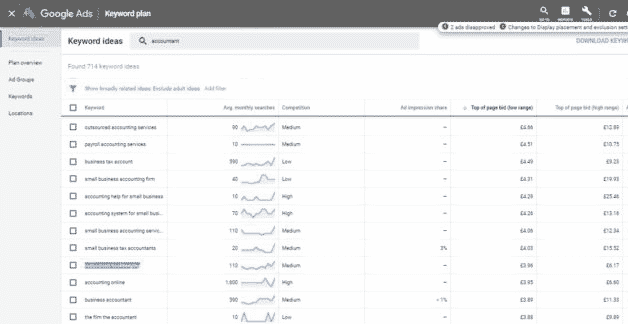
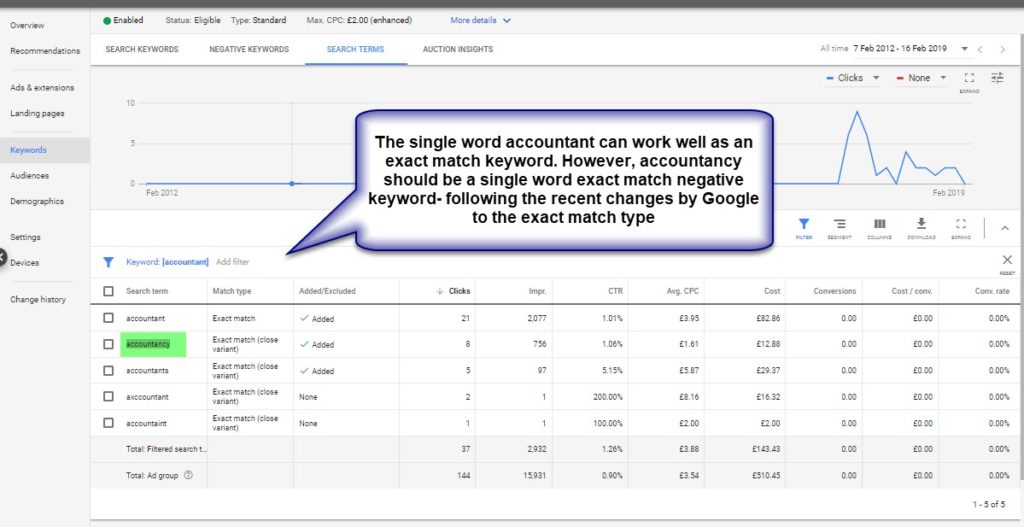
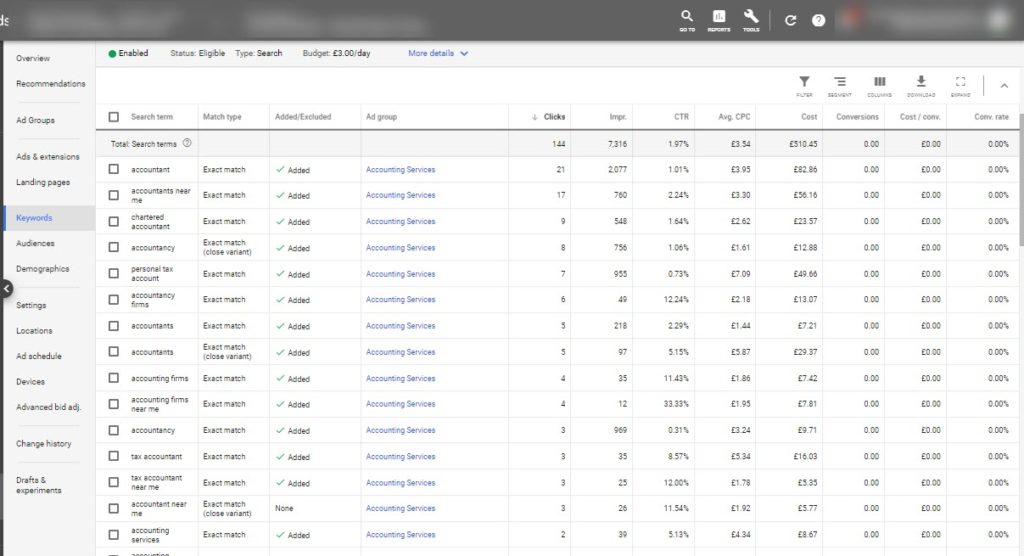
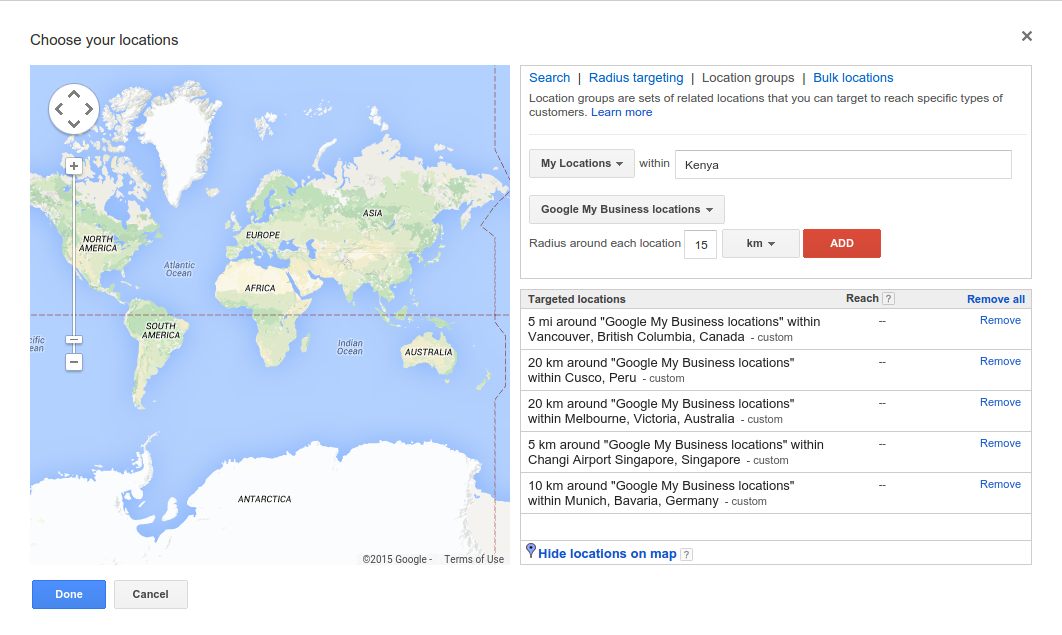
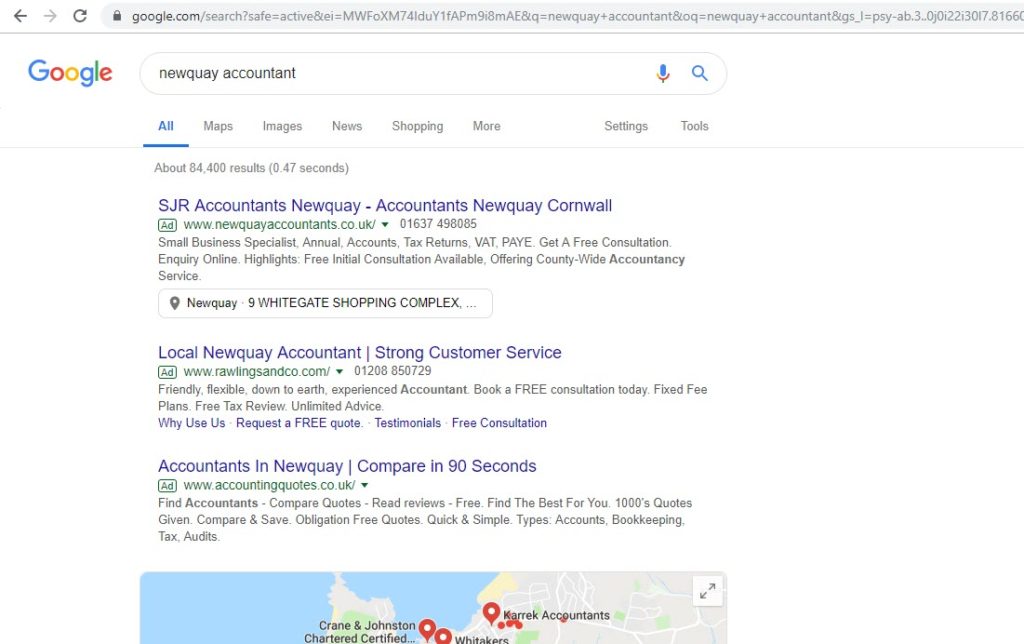










1 thought on “Google Ads for Accountants, Tax, Bookkeepers, Payroll”
i read your blog its very informative you can also find best Sherwin Currid Accountancy